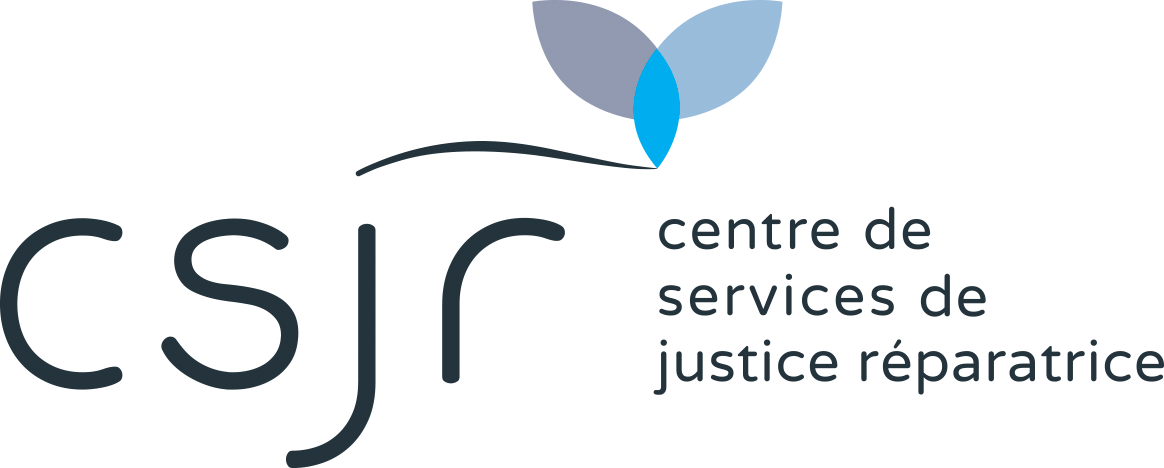The Centre for Services in Restorative Justice (CSJR) creates safe spaces where people or groups affected by situations of abuse and violence, whether within or outside the legal process, can express themselves, listen and share.
The purpose of the CSRJ : To repair the tapestry of human interconnectedness, in its individual and collective dimensions, through improbable encounters, where bonds of trust have been broken.
To do so,
- The Centre accompanies groups and individuals who have suffered or committed similar types of crimes, as well as other members of society who wish to engage in a restorative justice process based on encounters and dialogue.
- The Centre provides support for individuals who have experienced individual or collective abuse and violence in their need to express themselves, to be acknowledged
and to find healing. We also work with offenders as they seek to take responsibility and make reparation. - The Centre promotes public awareness, runs courses and encourages people to participate in the restorative justice process as a way of contributing to social peace.
Restorative Justice is a process promoting a dialogue and offers a platform to share one’s experience in a group setting allowing people affected by violence (victims, offenders and members of the society) to find a healing pathway together. This approach favours repairing the social bonds that were broken after the traumatic events.
This alternative approach to justice aims at providing support both for victims that need to get emotional relief from the destructive result of the crimes and provide support for the offenders. Offenders need assistance to gain awareness of the impact of their actions on individuals and on the society. Each process involving restorative justice takes into consideration the social aspect of violence, both in its causes and its consequences.
The core values of CSJR are as follows:
- Respect
- Listening
- Trust
- Inclusion
Discover our Charter of Values (French only) and our Equity, diversity and inclusion policy (French only).
The CSJR has an approach founded on:
- The fundamental principles of humanism, in its broadest sense.
- The involvement of volunteers trained and supported by the CSJR.
- The active participation of community members.
- Building capacity for accompaniment and empowerment, based on values of mentorship and co-development.
- A creative approach in the services offered and in intervention techniques used, with a focus on innovation and responses adapted to specific needs.
- Offering a service continuum: welcoming, assisting, and directing to any other follow-up services. This services are available during and after the restorative justice encounters as well as complementary workshop options for support.
- A province-wide network throughout Quebec of collaboration and partnership, both for the referral, delivery and deployment of services and for raising awareness of restorative justice.
CSJR’s Services
Most services offered by CSJR are free of charge.
- Restorative justice meetings and circles:
The CSJR organizes restorative justice meetings or discussion circles, within the prison system and/or the community. The meetings bring together people who have experienced or committed crimes of a similar nature but not related to the same event. Therefore, the meetings are focused on dialogue and not mediation.
Three types of participants are invited to the restorative justice meetings:
- Individuals that have been victims of criminal acts
- Individuals who have committed criminal acts
- Members of the society
The main objective of these meetings is to create a dialogue.
The group encounters take place over a seven-weeks period (called Victim Offender Encounters) or face to face (called Face-to-Face), with the latter more common. The meetings are facilitated, on a volunteer basis, by two facilitators, male and female, chosen for their human and professional qualities and trained by the CSJR.
The meetings are offered in the Greater Montreal region and, thanks to Regional committees, in Eastern Townships, Monteregie, Mauricie-Centre of Quebec, Lanaudiere and the Laurentians.
The Victim Offender encounters offered by CSJR were evaluated from 2005 to 2008 by the Correctional Service Canada and were found to have highly satisfactory results, which are available upon request. More information can be found in the FAQ.
Training is also provided in Canada, or internationally, which has been the case in France and Africa.
More information on Victim Offender Encounters.
- The workshops
The CSJR offers different workshops for individuals who have committed or been victim of criminal acts.
Click on the following links to get more information.
- Living with experiences of childhood sexual abuse
- The road toward reparations
- Constructive communication and restorative justice
- Art-therapy and creativity workshops
- Healing of memories
- The strength of our indigenous voices
- Raising awareness
The CSJR supports and accompanies individuals who wish to publicly share their experience with restorative justice. These testimonials allow for:
- Speaking freely;
- Breaking down stereotypes and taboos;
- Raising community awareness of the consequences of violence and the role of each individual in the restorative process;
- Promote self-esteem and affirmation;
- Contributes to prevention and restoration.
Testimonials of individuals who have been victims, offenders, or members of the community



